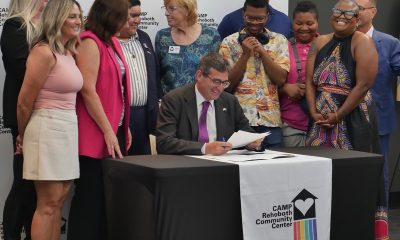National
Dance parties: End-of-summer fun or monkeypox super-spreaders?
Health officials urge precautions as cases reach 12,689

This is the time of year when gay men say farewell to summer with trips to the beach and resort towns for festivities, parties, and other revelry consisting of shirtless dancing and various forms of intimate contact — now a potential health risk as super-spreader events amid a monkeypox outbreak that continues to spread among men who have sex with men.
With the number of reported cases of monkeypox in the United States reaching 12,689 and demand for vaccines failing to keep up with supply, questions remain about taking precautions like those seen during the coronavirus epidemic as health experts and event organizers point to existing guidance to ensure a reasonable degree of safety.
Wes Combs, president of the CAMP Rehoboth board of directors, said his organization from the beginning of the monkeypox outbreak has been engaging with health officials at the state level in Delaware about what people should be looking for in terms of symptoms, as well as information about how people in high-risk categories can sign up to get vaccinations.
“As is everywhere in the country right now, where LGBTQ communities have big populations people are concerned, so we have received a number of calls about more information about monkeypox, about whether or not people can get vaccinated at CAMP Rehoboth,” Combs said.
A monkeypox town hall hosted by CAMP Rehoboth in conjunction with Delaware state health officials took place Tuesday, providing an opportunity to offer the latest information and answer questions about the monkeypox outbreak. CAMP Rehoboth announced it has been identified as one of two additional sites for vaccinations in addition to what the Department of Health provides from its health centers.
Rehoboth is among the many places in the United States where gay men are expected to flock to celebrate, along with Fire Island and Provincetown on the East Coast, making vaccinations against monkeypox in high demand at a time when the Biden administration is facing criticism for not making them more widely accessible. (Gay cruises for the summer, however, may not be among these events. A Carnival Cruise Line spokesperson said the charters team has no LGBTQ cruises coming up.)
Brad Perkins, chief medical officer at Karius, Inc., when asked about appropriate guidance for these end-of-summer events advised “trying to encourage community awareness and responsibility to isolate yourself and not infect others if you believe that you’ve been exposed or know that you’re infected.”
“But the longer game here is that we don’t want this disease to become endemic in the United States,” Perkins added. “And I think there’s a short-term threat, there’s a long term threat, both of them are really important [and] I think should weigh on decisions like the one you’re suggesting people need to make.”
Perkins said Karius, which works on advanced molecular technology for diagnosis of infectious diseases, is seeking to apply microbial cell-free DNA technology to create monkeypox tests earlier than options currently available, which require a sample from already developed skin lesions. The proposed testing has detected the virus in hospital patients, Perkins said, and following research over the course of the next few months may be available on an outpatient basis.
In Rehoboth, Combs said CAMP Rehoboth as a result of work with state officials is set to obtain 200 doses of JYNNEOS vaccine and, per guidance from the Centers for Disease Control & Prevention, plans to distribute them in a two-dose regimen, with the first dose set for Aug. 23 and second one on Sept. 28. As of Tuesday, Combs said CAMP Rehoboth has already scheduled appointments for 135 shots in the two-doze regimen, which is more than two-thirds of the total available shots.
“We are in talks with the state to [see] if they are able to get additional doses to create a larger vaccination site that’s capable of having more people vaccinated,” Combs added. “Right now, it’s one person every five minutes — over the span of from nine o’clock to three — and that’s the rate based on the number of doses. But if we can get more, we will do more, and we tell that to the state.”
Many of these end-of-summer events consist of gay men engaging in shirtless dancing in close proximity with each other as well as other intimate contact, creating ideal opportunities for a disease transmitted by skin-to-skin contact.
Be honest: While participants aren’t engaging in sexual activity as part of these events per se, they can lead to sexual encounters in the aftermath with a causal partner (or causal partners should these participants elect to have group sex to close out the night).
The CDC has guidance on its website for safer sex and social gatherings amid the monkeypox outbreak, which suggests festivals, events, and concerts where attendees are fully clothed and unlikely to share skin-to-skin contact are safer, as well as being mindful of activities (even kissing) that might spread monkeypox. Enclosed spaces, such as private and public sex parties where intimate and often anonymous sexual contact with multiple partners occurs, the CDC says, may have a higher likelihood of spreading monkeypox.
During the COVID epidemic, many group events required proof of vaccination and were even cancelled in an effort to mitigate the spread of the dangerous and potentially fatal disease. The same, however, cannot be said about events during the monkeypox outbreak, where the disease can be painful, but not fatal, and the availability of vaccines has not kept up with demand.
Combs said he’s unaware of any event being cancelled in Rehoboth due to monkeypox and, in fact, its biggest fundraiser of the year, the annual Sundance dance party is on track to happen over Labor Day weekend. Additionally, Combs said he cannot foresee a proof of vaccination requirement “largely because the availability of vaccines is so difficult to get right now, and there’s…high demand and low supply.”
“Certainly we understand what worked well with COVID, and that was getting information education out to the public about how this virus is transmitted and providing as much access to vaccines as possible,” Combs said. “So the one thing that is different is the number of vaccines available seems to be much lower, so I know that there’s lots of pressure being placed on the government at all levels to ensure that they get more supply to meet the demand that appears to be there.”
Perkins, asked whether precautions taken during COVID would be appropriate for monkeypox, drew a distinction between the two diseases, pointing out “the sort of positive take on monkeypox is that we’re somewhat prepared for this threat, mostly through efforts to prepare for smallpox.”
“Certainly, the most relevant one I think the community at this point is if you think you have been exposed, or, particularly if you’ve been exposed and you’re ill, getting vaccine, accessing the vaccine that’s available, or at least discussing being vaccinated as prophylaxis or at least, if not prophylaxis, prevention of infection, at least decreasing the severity of illness if it does occur,” Perkins said. “I think as is you know, it’s one of the good news stories of the efforts that have been taken to date.”
Although to date the transmission of monkeypox has been overwhelmingly among men who have sex with men, Perkins predicted that could change.
“In fact, we’re starting to see more cases outside that circle,” Perkins said. “I would expect that that will increase unless we control this epidemic. I think that will be a certainty moving forward that we’ll see a broader distribution of cases, because certainly the transmission of this infection, unlike HIV…includes routes of transmission that are non-sexual.”
Federal Government
Treasury Department has a gay secretary but LGBTQ staff are under siege
Agency reverses course on LGBTQ inclusion under out Secretary Scott Bessent

A former Treasury Department employee who led the agency’s LGBTQ employee resource group says the removal of sexual orientation and gender identity (SOGI) from its discrimination complaint forms was merely a formalization of existing policy shifts that had already taken hold following the second inauguration of President Donald Trump and his appointment of Scott Bessent — who is gay — to lead the agency.
Christen Boas Hayes, who served on the policy team at Treasury’s Financial Crimes Enforcement Network (FinCEN) from 2020 until March of this year, told the Washington Blade during a phone interview last week that the agency had already stopped processing internal Equal Employment Opportunity (EEO) complaints on the basis of anti-LGBTQ discrimination.
“So the way that the forms are changing is a procedural recognition of something that’s already happening,” said Hayes. “Internally, from speaking to two EEO staff members, the changes are already taking place from an EEO perspective on what kind of cases will be found to have the basis for a complaint.”
The move, they said, comes amid the deterioration of support structures for LGBTQ workers at the agency since the administration’s early rollout of anti-LGBTQ executive orders, which led to “a trickle down effect of how each agency implements those and on what timeline,” decisions “typically made by the assistant secretary of management’s office and then implemented by the appropriate offices.”
At the end of June, a group of U.S. House Democrats including several out LGBTQ members raised alarms after a Federal Register notice disclosed Treasury’s plans to revise its complaint procedures. Through the agency’s Office of Civil Rights and EEO, the agency would eliminate SOGI as protected categories on the forms used by employees to initiate claims of workplace discrimination.
But Hayes’s account reveals that the paperwork change followed months of internal practice, pursuant to a wave of layoffs targeting DEI personnel and a chilling effect on LGBTQ organizing, including through ERGs.
Hayes joined Treasury’s FinCEN in 2020 as the agency transitioned into the Biden-Harris administration, working primarily on cryptocurrency regulation and emerging technologies until they accepted a “deferred resignation” offer, which was extended to civil servants this year amid drastic staffing cuts.
“It was two things,” Hayes said. “One was the fact that the policy work that I was very excited about doing was going to change in nature significantly. The second part was that the environment for LGBTQ staff members was increasingly negative after the release of the executive orders,” especially for trans and nonbinary or gender diverse employees.
“At the same time,” Hayes added, “having been on the job for four years, I also knew this year was the year that I would leave Treasury. I was a good candidate for [deferred resignation], because I was already planning on leaving, but the pressures that emerged following the change in administration really pushed me to accelerate that timeline.”
Some ERGs die by formal edict, others by a thousand cuts
Hayes became involved with the Treasury LGBTQ ERG shortly after joining the agency in 2020, when they reached out to the group’s then-president — “who also recently took the deferred resignation.”
“She said that because of the pressure that ERGs had faced under the first Trump administration, the group was rebuilding, and I became the president of the group pretty quickly,” Hayes said. “Those pressures have increased in the second Trump administration.”
One of the previous ERG board members had left the agency after encountering what Hayes described as “explicitly transphobic” treatment from supervisors during his gender transition. “His supervisors denied him a promotion,” and, “importantly, he did not have faith in the EEO complaint process” to see the issues with discrimination resolved, Hayes said. “And so he decided to just leave, which was, of course, such a loss for Treasury and our Employee Resource Group and all of our employees at Treasury.”
The umbrella LGBTQ ERG that Hayes led included hundreds of members across the agency, they said, and was complemented by smaller ERGs at sub-agencies like the IRS and FinCEN — several of which, Hayes said, were explicitly told to cease operations under the new administration.
Hayes did not receive any formal directive to shutter Treasury’s ERG, but described an “implicit” messaging campaign meant to shut down the group’s activities without issuing anything in writing.
“The suggestion was to stop emailing about anything related to the employee resource group, to have meetings outside of work hours, to meet off of Treasury’s campus, and things like that,” they said. “So obviously that contributes to essentially not existing functionally. Because whereas we could have previously emailed our members comfortably to announce a happy hour or a training or something like that, now they have to text each other personally to gather, which essentially makes it a defunct group.”
Internal directories scrubbed, gender-neutral restrooms removed
Hayes said the dismantling of DEI staff began almost immediately after the executive orders. Employees whose position descriptions included the terms “diversity, equity, and inclusion” were “on the chopping block,” they said. “That may differ from more statutorily mandated positions in the OMWI office or the EEO office.”
With those staff gone, so went the infrastructure that enabled ERG programming and community-building. “The people that made our employee resource group events possible were DEI staff that were fired. And so, it created an immediate chilling effect on our employee resource group, and it also, of course, put fear into a lot of our members’ hearts over whether or not we would be able to continue gathering as a community or supporting employees in a more practical way going forward. And it was just, really — it was really sad.”
Hayes described efforts to erase the ERGs from internal communication channels and databases. “They also took our information off internal websites so nobody could find us as lawyers went through the agency’s internal systems to scrub DEI language and programs,” they said.
Within a week, Hayes said, the administration had removed gender-neutral restrooms from Main Treasury, removed third-gender markers from internal databases and forms, and made it more difficult for employees with nonbinary IDs to access government buildings.
“[They] made it challenging for people with X gender markers on identification documents to access Treasury or the White House by not recognizing their gender marker on the TWAVES and WAVES forms.”
LGBTQ staff lack support and work amid a climate of isolation
The changes have left many LGBTQ staff feeling vulnerable — not only because of diminished workplace inclusion, but due to concerns about job security amid the administration’s reductions in force (RIFs).
“Plenty of people are feeling very stressed, not only about retaining their jobs because of the layoffs and pending questions around RIFs, but then also wondering if they will be included in RIF lists because they’re being penalized somehow for being out at work,” Hayes said. “People wonder if their name will be given, not because they’re in a tranche of billets being laid off, but because of their gender identity or sexual orientation.”
In the absence of functional ERGs, Hayes said, LGBTQ employees have been cut off from even informal networks of support.
“Employees [are] feeling like it’s harder to find members of their own community because there’s no email anymore to ask when the next event is or to ask about navigating healthcare or other questions,” they said. “If there is no ERG to go to to ask for support for their specific issue, that contributes to isolation, which contributes to a worse work environment.”
Hayes said they had not interacted directly with Secretary Bessent, but they and others observed a shift from the previous administration. “It is stark to see that our first ‘out’ secretary did not host a Pride event this year,” they said. “For the last three years we’ve flown the rainbow Pride flag above Treasury during Pride. And it was such a celebration among staff and Secretary Yellen and the executive secretary’s office were super supportive.”
“Employees notice changes like that,” they added. “Things like the fact that the Secretary’s official bio says ‘spouse’ instead of ‘husband.’ It makes employees wonder if they too should be fearful of being their full selves at work.”
The Blade contacted the Treasury Department with a request for comment outlining Hayes’s allegations, including the removal of inclusive infrastructure, the discouragement of ERG activity, the pre-formalization of EEO policy changes, and the targeting of DEI personnel. As of publication, the agency has not responded.
U.S. Supreme Court
Supreme Court to consider bans on trans athletes in school sports
27 states have passed laws limiting participation in athletics programs

The U.S. Supreme Court on Thursday agreed to hear two cases involving transgender youth challenging bans prohibiting them from participating in school sports.
In Little v. Hecox, plaintiffs represented by the ACLU, Legal Voice, and the law firm Cooley are challenging Idaho’s 2020 ban, which requires sex testing to adjudicate questions of an athlete’s eligibility.
The 9th U.S. Circuit Court of Appeals described the process in a 2023 decision halting the policy’s enforcement pending an outcome in the litigation. The “sex dispute verification process, whereby any individual can ‘dispute’ the sex of any female student athlete in the state of Idaho,” the court wrote, would “require her to undergo intrusive medical procedures to verify her sex, including gynecological exams.”
In West Virginia v. B.P.J., Lambda Legal, the ACLU, the ACLU of West Virginia, and Cooley are representing a trans middle school student challenging the Mountain State’s 2021 ban on trans athletes.
The plaintiff was participating in cross country when the law was passed, taking puberty blockers that would have significantly reduced the chances that she could have a physiological advantage over cisgender peers.
“Like any other educational program, school athletic programs should be accessible for everyone regardless of their sex or transgender status,” said Joshua Block, senior counsel for the ACLU’s LGBTQ and HIV Project. “Trans kids play sports for the same reasons their peers do — to learn perseverance, dedication, teamwork, and to simply have fun with their friends,” Block said.
He added, “Categorically excluding kids from school sports just because they are transgender will only make our schools less safe and more hurtful places for all youth. We believe the lower courts were right to block these discriminatory laws, and we will continue to defend the freedom of all kids to play.”
“Our client just wants to play sports with her friends and peers,” said Lambda Legal Senior Counsel Tara Borelli. “Everyone understands the value of participating in team athletics, for fitness, leadership, socialization, and myriad other benefits.”
Borelli continued, “The U.S. Court of Appeals for the Fourth Circuit last April issued a thoughtful and thorough ruling allowing B.P.J. to continue participating in track events. That well-reasoned decision should stand the test of time, and we stand ready to defend it.”
Shortly after taking control of both legislative chambers, Republican members of Congress tried — unsuccessfully — to pass a national ban like those now enforced in 27 states since 2020.
Federal Government
UPenn erases Lia Thomas’s records as part of settlement with White House
University agreed to ban trans women from women’s sports teams

In a settlement with the Trump-Vance administration announced on Tuesday, the University of Pennsylvania will ban transgender athletes from competing and erase swimming records set by transgender former student Lia Thomas.
The U.S. Department of Education’s Office for Civil Rights found the university in violation of Title IX, the federal rights law barring sex based discrimination in educational institutions, by “permitting males to compete in women’s intercollegiate athletics and to occupy women-only intimate facilities.”
The statement issued by University of Pennsylvania President J. Larry Jameson highlighted how the law’s interpretation was changed substantially under President Donald Trump’s second term.
“The Department of Education OCR investigated the participation of one transgender athlete on the women’s swimming team three years ago, during the 2021-2022 swim season,” he wrote. “At that time, Penn was in compliance with NCAA eligibility rules and Title IX as then interpreted.”
Jameson continued, “Penn has always followed — and continues to follow — Title IX and the applicable policy of the NCAA regarding transgender athletes. NCAA eligibility rules changed in February 2025 with Executive Orders 14168 and 14201 and Penn will continue to adhere to these new rules.”
Writing that “we acknowledge that some student-athletes were disadvantaged by these rules” in place while Thomas was allowed to compete, the university president added, “We recognize this and will apologize to those who experienced a competitive disadvantage or experienced anxiety because of the policies in effect at the time.”
“Today’s resolution agreement with UPenn is yet another example of the Trump effect in action,” Education Secretary Linda McMahon said in a statement. “Thanks to the leadership of President Trump, UPenn has agreed both to apologize for its past Title IX violations and to ensure that women’s sports are protected at the university for future generations of female athletes.”
Under former President Joe Biden, the department’s Office of Civil Rights sought to protect against anti-LGBTQ discrimination in education, bringing investigations and enforcement actions in cases where school officials might, for example, require trans students to use restrooms and facilities consistent with their birth sex or fail to respond to peer harassment over their gender identity.
Much of the legal reasoning behind the Biden-Harris administration’s positions extended from the 2020 U.S. Supreme Court case Bostock v. Clayton County, which found that sex-based discrimination includes that which is based on sexual orientation or gender identity under Title VII rules covering employment practices.
The Trump-Vance administration last week put the state of California on notice that its trans athlete policies were, or once were, in violation of Title IX, which comes amid the ongoing battle with Maine over the same issue.



















